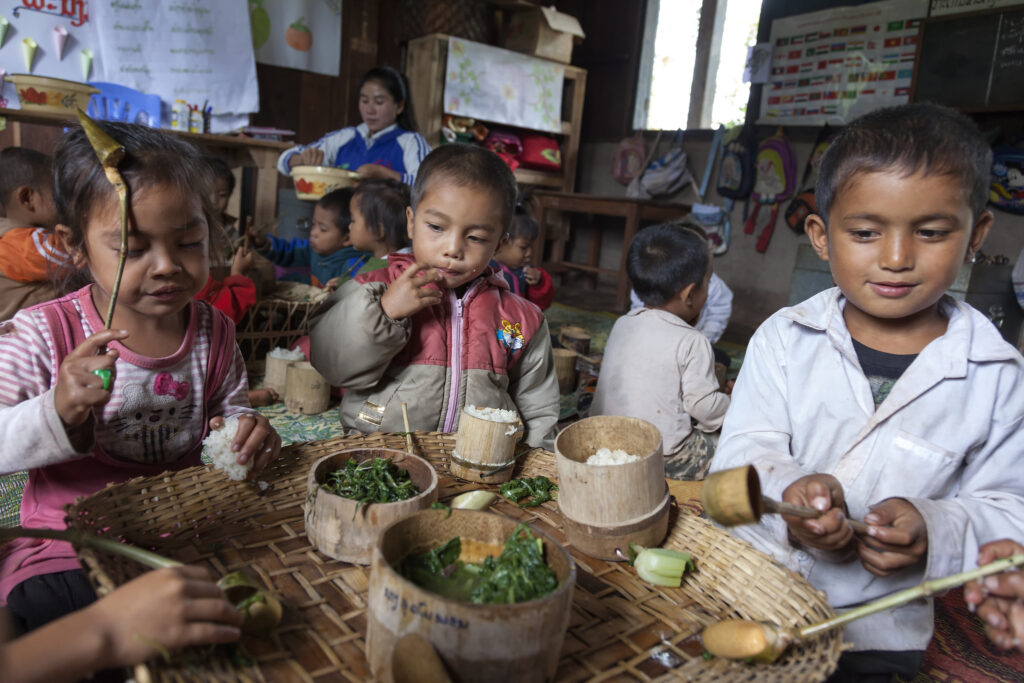This Thursday, 18 September 2025, governments, partners and civil society will gather in Fortaleza, Brazil, for the second Global Summit of the School Meals Coalition (SMC). More than 40 countries will stand accountable for the commitments they made in Paris two years ago, making it a critical moment to assess progress and push for stronger action.
As the SUN Civil Society Network (SUN CSN), we are proud to bring the voices of over 5,000 organisations into this global conversation. Our national civil society alliances (CSAs) work every day to turn promises into practice – ensuring that school meals are not just delivered, but that they are inclusive, equitable, nutrition sensitive and locally grounded.
Across our network, our school meal programmes are anchored in the realities of schools and communities, involving parents and caregivers, and creating supportive school food environments where children can learn about nutrition and healthy choices. In Laos, for example, strong behaviour change programmes encourage children to eat more vegetables, linking school meals to healthier diets at home.
Civil society also takes a long-term view and is actively engaged in building sustainability into school meals. In countries like the Philippines, our members are pioneering regenerative school gardens that double as classrooms for climate and nutrition education. In Tanzania, alliances promote homestead food production so that schools and households have access to diverse, nutritious foods.
Civil society is also helping generate the evidence that shapes national policy. In the Republic of Congo, a CSA-led survey on school canteens gave government officials the data they needed to improve menus and food standards. In Panama, civil society voices were instrumental in shaping two national policies on food education and physical activity, ensuring that school meals sit within a broader framework for child health.
Sometimes, the work of civil society can turn pilot programmes into policy. In Sierra Leone, a CSA piloted home-grown school feeding after participating in a SUN CSN capacity strengthening training on nutrition-sensitive programming in the Philippines. This effort directly contributed to the government including school gardens and home-grown feeding in its national nutrition commitments – a clear example of advocacy driving systemic change.
Elsewhere, civil society is making sure governments are held accountable to their promises. In Cambodia, our SUN CSA worked with the SUN Focal Point to secure a school meals expansion commitment as part of the country’s Nutrition for Growth pledge, and continues to monitor that progress is on track. In Honduras, our members are pushing for inclusive school feeding to be fully integrated into national nutrition and food security strategies.
And because school meals are also about the future, young people have a strong role to play. On International School Meals Day, the SUN CSN co-organised the Global School Meals Youth Dialogue, where young leaders from Guinea-Conakry, the Democratic Republic of the Congo, Uganda and Kenya spoke powerfully about what equitable and sustainable school meal programmes should look like.
Civil society also thrives on collaboration and learning. At the end of September, CSAs from Sri Lanka, Laos, Vietnam and the Philippines, supported by C4N-SUN, will come together for a peer learning exchange in Manila, co-developing action plans with their governments to accelerate progress on school meals. This kind of South–South collaboration is exactly how innovations can scale quickly across borders.
As we head into the Summit, our message is clear: civil society is essential to making sure that children regularly receive nutritious, healthy school meals. Our network brings proximity, trust and innovation. We link global commitments to local realities. And we hold governments, partners and ourselves accountable for ensuring that all children can learn and thrive at school and beyond.
Read the joint statement by the School Meals Coalition here.
Image: World Bank


